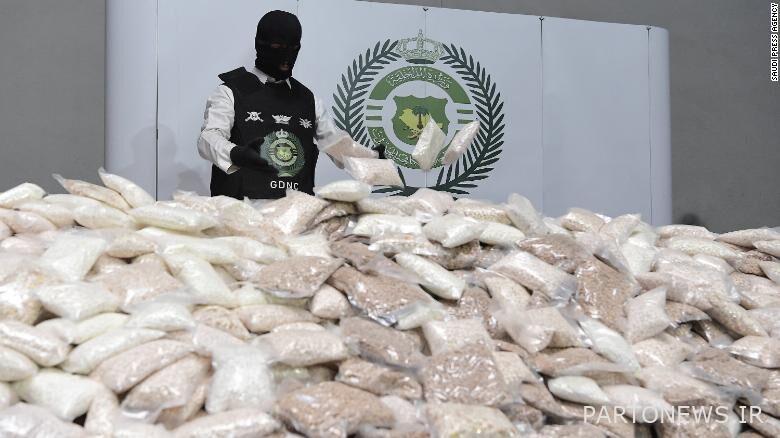CNN: Saudi Arabia is the main destination for drugs in West Asia

According to IRNA’s report on Saturday; Last Wednesday, Saudi authorities seized the largest shipment of illegal drugs in the country’s history by discovering nearly 47 million amphetamine pills in a shipment of flour and confiscating a warehouse in the capital Riyadh.
This operation shows what experts say about the increasing role of Saudi Arabia as the drug capital in the Middle East, the increase in demand and the country becoming the first destination for smugglers from Syria and Lebanon, as well as the position of Saudi Arabia as the largest and most profitable drug destination in the Middle East region. Consolidation of this position.
Although the Saudi authorities did not mention the name and type of seized drugs and their origin, the United Nations Office on Drugs and Crime had previously announced that reports about the seizure of amphetamines in Middle Eastern countries still refer to pills. that they have the Captagon brand and name for themselves.
The European Monitoring Center for Drugs and Drug Addiction announced: Captagon was originally a registered name for pharmaceutical products containing the synthetic stimulant phenytoin, which is now no longer produced legally, and counterfeit drugs with the Captagon brand are usually discovered in the Middle East. and is recorded.
Seizures of Captagon drug shipments in Saudi Arabia and other countries in the region are increasingly expanding. The United States Coast Guard recently discovered a shipment of 320 kilograms of methamphetamine pills and nearly three tons of hashish worth millions of dollars from a fishing boat in the Gulf of Oman.
According to Wanda Felbab-Brown, a member of the Brookings Institute in Washington, DC, who has written about this, these substances have been widespread in Saudi Arabia since nearly 15 years ago, but since five years ago, perhaps together with cannabis (hashish/marijuana), they have been strongly It has become more popular.
One of the reasons for the expansion of Captagon’s use is the flood of supply, especially from Syria, which is produced on an industrial scale.
Saudi Arabia’s International Communications Center did not respond to CNN’s request for comment.
The statistics and figures of the International Addiction Research Journal indicate that if each captagon pill is valued at 10 to 25 dollars, the total market value of the recent cargo seized in Saudi Arabia, if it is of this type, is up to 1 billion and 100 million dollars.
Although hashish and khat are common in Saudi Arabia, amphetamines are popular among the country’s youth, according to Carolyn Rose, a senior analyst at NewLines in Washington, D.C., who studies Captagon’s deals.
The 2021 edition of Crime, Law and Social Transformation quoted a Captagon Saudi user who wrote that because this substance is in the form of a small pill, my classmates and I like it more than hashish. Because unlike hashish, we can get it in pill form. By receiving 25 rials from our parents, we can prepare a pill and enjoy it.
Felbab Brown told CNN that due to extreme fatigue and lack of social opportunities in Saudi Arabia, many young people in this country have turned to drugs.
Following the issuance of licenses by the Saudi government in the last few years for private addiction treatment institutions, a number of these centers have been established in this country.
According to Khaled Al-Mashari, the manager of one of these centers, nearly four or five centers have been established in the last 2 years, which is a sign of the government’s recognition of the importance of drug addiction and also the spread of this problem. The demand for hospitalization in these centers is high, although at least addicts now have an option instead of traveling to neighboring countries for addiction treatment.
According to Rose; Although the prohibition of drug consumption in this country has not disappeared, it is becoming more difficult to ignore the government’s desire to secure this issue and to underestimate its role as a destination market.
Felbab-Brown adds: Anti-narcotics policies in the Middle East are focused on the most severe reactions, and in this region, unlike other parts of the world, which have abandoned strict and mostly ineffective or even counterproductive policies, they often rely on this. Methods are emphasized. Imprisoning drug users is ineffective and even counterproductive.
According to IRNA; Before this, the Lebanese authorities arrested a number of traffickers of drugs and psychoactive pills, among them are Saudi princes.
One of them, who was arrested at Lebanon airport in November 2014, was Abdul Mohsen bin Waleed bin Abdul Mohsen bin Abdul Aziz. The Lebanese National News Agency wrote at that time that this Saudi prince intended to smuggle about two tons of drugs from Lebanon to Saudi Arabia. This shipment belonging to Abdul Mohsen bin Waleed bin Abdul Mohsen bin Abdul Aziz included 24 packages and eight suitcases containing Captagon type drugs and was supposed to be smuggled to the “Hael region” (in the northwest of Saudi Arabia).
In this regard, the English magazine Economist revealed in July 1400 that the Saudi princes are involved in drug smuggling from Syria for sale in Saudi Arabia and other Arab countries in the Persian Gulf. Some Saudi princes use their private jets to smuggle psychoactive pills, which is more than 50 times the cost of buying them in Syria.

